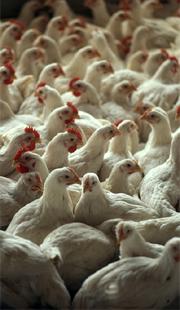 Avian influenza could become common in European flocks© Punchstock
Avian influenza could become common in European flocks© PunchstockAvian flu is probably here to stay, experts are warning Europe's governments.
European Union agriculture ministers met today in Brussels to coordinate immediate reactions to the H5N1 virus, which has been now been detected in birds across the continent, from Turkey through France. Scientists studying the spread of the disease say that ministers will need to think decades ahead in forming policy decisions about how to deal with the threat, or farmers could suffer.
Matt Conway, a spokesperson from the UK’s department for environment, food and rural affairs (Defra) told news@nature that with only sporadic outbreaks in Europe, there is no evidence that the virus will take permanent hold. And the situation for keeping poultry is quite different in the United Kingdom than it is in Asia, he points out.
But scientists contacted by news@nature were not optimistic. “The virus is highly likely to become endemic,” says Peter Openshaw, head of the respiratory viral infections section at the National Heart and Lung Institute in London, UK. “We have to change the way poultry are farmed.”
But how exactly things should be changed is unclear.
Quick reaction
Emergency steps have been taken against the outbreaks and suspected incidences in Europe so far. France detected its first case, in a wild duck in Lyon, this weekend, and officials have since decided to vaccinate poultry in three at-risk areas. In Germany, 250 soliders have been sent to clear dead birds from the Baltic Sea island of Rügen, where 81 birds have tested positive for the virus.
H5N1 has so far been confirmed in birds in France, Bulgaria, Romania, Greece, Austria, Italy, Germany and the European part of Russia. Britain, along with several eastern European countries, are investigating possible outbreaks.
Combined with heightened awareness amongst members of the public, who are alerting authorities to sightings of dead birds, measures such as these should help prevent an epidemic in domestic poultry, say experts.
But such fire-fighting, while probably proving effective at staving off an epidemic in commercial flocks, may not prevent the virus becoming established in wild birds.
Long-term survival
Jan Slingenbergh, an animal health expert at the United Nation’s Food and Agriculture Organization (FAO) in Rome, Italy, points out that H5N1 may survive in icy lake waters over European winters, potentially infecting any migratory birds that subsequently arrive.
The virus could also become established in permanently resident European birds; Openshaw notes that H5N1 has so far been able to infect a wide range of species.
“We have to change the way poultry are farmed.”
Peter Openshaw
head of the respiratory viral infections section at the National Heart and Lung Institute in London.
If this happens, farming practices will have to be changed, says Neil Ferguson, an epidemiologist at Imperial College London, UK, who is advising the British government on how to deal with possible future outbreaks.
Free-range farms would be particularly at risk. Wild birds are attracted to such premises because of the availability of food, so the likelihood of transmission from wild birds to poultry would be high. And the potentially devastating impact of the virus being spread onwards to health workers would probably require infected flocks to be culled, even if such events became common.
Shot in the arm
Ministers at the Bruseels meeting will discuss whether vaccination could help. Innoculation can protect poultry, but could be costly. Hundreds of millions of doses could be required annually across Europe. And free-range birds would have to kept indoors for the two weeks to allow the vaccine's protective powers to kick in. This would mean a significant extra cost for animals that are typically slaughtered after two to three months.
ADVERTISEMENT
Slingenbergh says the FAO acknowledges these problems, but is focusing on the more pressing concern of dealing with long-term infection in Asia. In China alone, millions of small-scale farmers keep poultry. Researchers believe the virus is evolving rapidly there, increasing the chance that future strains, some perhaps more dangerous to humans than current versions, may arise in the country.
Post a comment to this story by visiting our fluheretostay.html">newsblog.
head of the respiratory viral infections section at the National Heart and Lung Institute in London.
